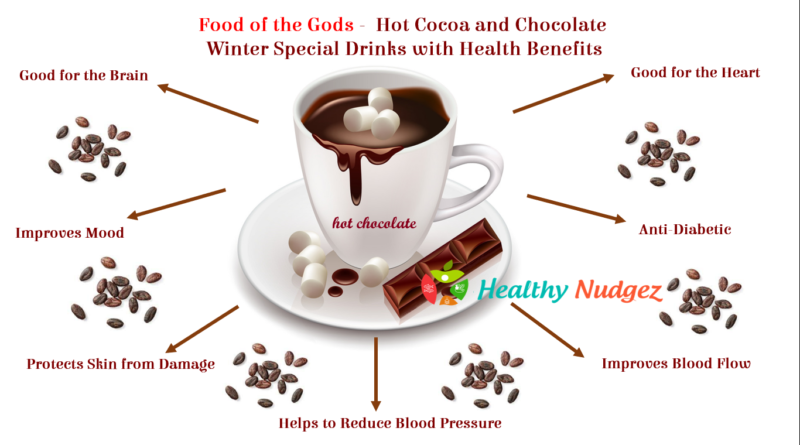Hot Cocoa or Hot Chocolate (Food of Gods): Health Benefits of these Winter Special Drinks
Cocoa powder, used to make beverages and as a flavoring agent, is prepared from cocoa beans, the fruit of cacao. Cacao, (Theobroma cacao), also called cocoa is a tropical evergreen tree grown for its edible seeds, whose scientific name means “food of the Gods” in Greek. Cocoa beans are processed into cocoa powder, cocoa butter, and chocolate. It is the key ingredient in chocolate and chocolate confections.
Hot chocolate also known as hot cocoa or drinking chocolate is a hot drink made of shaved or melted chocolate or cocoa powder, hot milk or water and a sweetener.
Nutritive Constituents of Cocoa and Chocolate: Cocoa is a highly concentrated food and provides about 100 calories per 100 gm. The nutrients present in cocoa are:
- Carbohydrates: simple and complex
- Fats: monounsaturated and saturated same as in olive oil, called cocoa butter
- Proteins: responsible for flavour
- Insoluble fibre: 2 gm per table spoon
- Minerals: potassium, phosphorus, copper, iron, zinc, and magnesium
- Antioxidant (polyphenols) flavonoids: Cocoa bean is one of the best-known sources of dietary polyphenols (flavanols), containing more phenolic antioxidants than most foods
- Cocoa also has theobromine and caffeine, both are stimulants
Health Effects of Cocoa and Dark Chocolate
Positive Health Effects Cocoa can protect nerves from injury and inflammation, protect the skin from oxidative damage from UV radiation in topical preparations, and have beneficial effects on satiety, cognitive function, and mood. A number of beneficial health effects of regular consumption of cocoa have been seen which include:- Beneficial effects on blood pressure: They have a blood pressure lowering effect due to the presence of minerals like magnesium and potassium. Many studies have shown that cocoa and dark chocolate help reduce blood pressure, by helping the blood vessels to relax thereby decreasing resistance to blood flow.
- Prevention of Heart Disease: Regular consumption of cocoa and cocoa rich foods such as dark chocolate has been shown to improve heart health. It helps to increase blood HDL (Good Cholesterol) levels and decrease LDL (bad cholesterol) levels, thereby promoting heart health.
- Reduced insulin resistance: Cocoa flavanols offer potential as antidiabetic agents, especially with type 2 diabetes mellitus (DM type II). Flavanols reduce insulin resistance and improve sugar uptake by the cells. Insulin resistance is the most common risk factor for heart disease and DM type II.
- Improved vascular and platelet function: The flavanols in cocoa and dark chocolate reduce platelet aggregation in the blood vessels. thereby reducing the risk of stroke.
- Beneficial Effects on glucose metabolism: Cocoa and its flavanols improve glucose homeostasis by slowing carbohydrate digestion and absorption in the gut.
- Beneficial effects on brain function: There is evidences of some beneficial effects of regular cocoa or dark chocolate consumption on the central nervous system through improving the blood flow to the nervous system. Regular chocolate intake was linked with a decreased risk of cognitive decline in elderly people (≥ 65 years). Also, theobromine and caffeine have a short-term stimulating effect on the central nervous system.
- Improved mood and psychological health: Chocolate or cocoa consumption has also been seen to be positively associated with mood and psychological health. The feeling of satiety brought on by the consumption of cocoa and chocolate has associated with an increase in cerebral serotonin synthesis, which produces a feeling of energy and pleasure. chocolate consumption can improve a negative mood state in the short-term. The sensory pleasure of eating chocolate also leads to improved mood.
- Protection of skin from UV ray damage: the flavanols in cocoa and dark chocolate may protect the skin from the sun’s UV rays. The flavanols can protect against sun damage, improve blood flow to the skin, and increase skin density and hydration.

